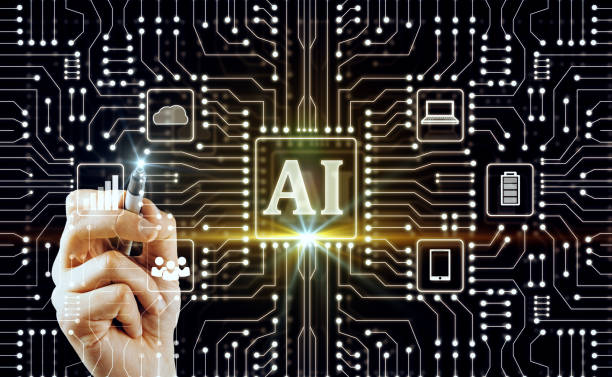What is Artificial Intelligence? Definition, History, and Basic Concepts
#ArtificialIntelligence (AI) generally refers to the ability of a computer system to mimic human cognitive functions, such as learning, reasoning, problem-solving, and understanding natural language.
Artificial Intelligence is a broad and multidisciplinary field rooted in computer science, mathematics, philosophy, and cognitive science.
The history of artificial intelligence dates back to the 1950s, when researchers began exploring the possibility of building machines that could think like humans.
Since then, artificial intelligence has made significant advances and is now used in a wide range of applications.
Basic concepts such as Machine Learning, Deep Learning, and Neural Networks are the main pillars of artificial intelligence.
Machine learning allows machines to learn from data without being explicitly programmed.
Deep learning is a subset of machine learning that uses multi-layered neural networks to analyze data.
Today, artificial intelligence is used in various fields, including medicine, finance, transportation, and manufacturing.
For example, in medicine, artificial intelligence can help diagnose diseases, develop drugs, and provide personalized healthcare.
In finance, artificial intelligence can be used to identify fraud, manage risk, and provide personalized financial services.
Did you know that your website is your customers’ first impression of your company? Multiply your business’s credibility with a powerful corporate website from Rasaweb!
✅ Custom and eye-catching design tailored to your brand
✅ Improved user experience and increased customer engagement
⚡ Get a free consultation!
Types of Artificial Intelligence: Approaches and Applications
Artificial intelligence can be classified into different types based on its capabilities and performance.
One of the most common classifications is dividing artificial intelligence into Narrow AI and General AI.
Narrow AI is designed to perform specific tasks and performs very well in those tasks, but it cannot perform tasks for which it was not programmed.
Examples of Narrow AI include voice assistants like Siri and Alexa, movie and music recommendation systems, and facial recognition software.
Click here to preview your posts with PRO themes ››
General AI is a type of artificial intelligence that is capable of understanding, learning, and applying knowledge across a wide range of tasks, just like humans.
General AI is still in the early stages of development, and no example of it currently exists.
In addition, artificial intelligence can be categorized based on the methods used in it, such as Rule-based AI, Machine Learning-based AI, and Hybrid AI.
Different approaches to artificial intelligence have different applications.
For example, rule-based artificial intelligence is suitable for expert systems and business process automation, while machine learning-based artificial intelligence is used for pattern recognition and event prediction.
Machine Learning, the Beating Heart of Artificial Intelligence
Machine Learning, as one of the most important sub-branches of #ArtificialIntelligence, allows systems to learn from data and improve their performance without explicit programming.
In fact, machine learning is a collection of algorithms and techniques that allow computers to identify patterns and relationships in data and make decisions or predictions based on them.
There are different types of machine learning algorithms, including Supervised Learning, Unsupervised Learning, and Reinforcement Learning.
In supervised learning, the algorithm is trained using labeled data, i.e., data for which the correct answer is known.
In unsupervised learning, the algorithm is trained using unlabeled data and must discover patterns and structures in the data on its own.
In reinforcement learning, the algorithm learns how to maximize a specific goal by interacting with an environment.
Machine learning has very wide applications, including fraud detection, sales forecasting, product recommendations, facial recognition, and autonomous driving.
| Algorithm Type | Description | Applications |
|---|---|---|
| Supervised Learning | Training with labeled data | Fraud detection, sales forecasting |
| Unsupervised Learning | Discovering patterns in unlabeled data | Customer clustering, market basket analysis |
| Reinforcement Learning | Learning through interaction with the environment | Computer games, robotics |
Deep Learning and Neural Networks, Imitating the Human Brain
Deep Learning is a subset of machine learning that uses Artificial Neural Networks with multiple layers to analyze data.
These networks are inspired by the structure of the human brain and are capable of learning complex and abstract patterns from data.
Neural networks are made up of nodes called neurons that are connected in layers.
Each neuron receives an input, processes it, and produces an output.
The weights of the connections between neurons are adjusted during training so that the network can learn the patterns in the data.
Deep learning is used in various fields, including image processing, natural language processing, and speech recognition.
For example, in image processing, deep learning can be used to detect objects, faces, and scenes.
In natural language processing, deep learning can be used to translate languages, generate text, and understand the meaning of text.
Are you tired of your company’s website not being seen as it should be and losing potential customers? Solve this problem forever with professional and effective website design by Rasaweb!
✅ Increase brand credibility and build customer trust
✅ Attract targeted sales leads
⚡ Contact us now for a free consultation!
Natural Language Processing, a Bridge Between Humans and Machines
Natural Language Processing (NLP) is a branch of artificial intelligence that enables computers to understand, interpret, and generate human language.
Natural Language Processing involves a set of techniques and algorithms used to analyze the structure and meaning of language, extract information, and generate text.
The applications of natural language processing are very wide, including machine translation, text summarization, sentiment analysis, chatbots, and voice assistants.
For example, machine translation allows computers to translate text from one language to another.
Text summarization allows computers to generate a summary of a long text.
Sentiment analysis allows computers to detect the emotions present in a text.
Chatbots are computer programs that can interact with humans in natural language.
Natural language processing plays an important role in the development of artificial intelligence and enables machines to communicate with humans in a more natural and effective way.
Practical Applications of Artificial Intelligence in Various Industries
Artificial intelligence is reshaping various industries, and its practical applications are expanding day by day.
In the medical sector, artificial intelligence can help diagnose diseases, develop drugs, provide personalized healthcare, and improve the efficiency of hospitals.
For example, artificial intelligence algorithms can analyze medical images and detect early signs of cancer.
In the financial sector, artificial intelligence can be used to identify fraud, manage risk, provide personalized financial services, and improve investment decision-making.
For example, artificial intelligence algorithms can identify suspicious patterns in financial transactions and prevent fraud from occurring.
In the manufacturing sector, artificial intelligence can be used to automate processes, improve product quality, reduce costs, and increase productivity.
For example, robots equipped with artificial intelligence can perform repetitive and dangerous tasks on production lines.
In the transportation sector, artificial intelligence can be used to develop self-driving cars, improve traffic flow, reduce accidents, and provide intelligent transportation services.
Advantages and Disadvantages of Artificial Intelligence, a Realistic View
Artificial intelligence has many advantages, including increased productivity, reduced costs, improved accuracy, automation of tasks, and solving complex problems.
But artificial intelligence also has disadvantages, including high development costs, the need for technical expertise, ethical concerns, and the potential for job loss.
Artificial intelligence can automatically perform tasks that humans cannot or do not want to do, which can lead to increased productivity and reduced costs.
Artificial intelligence algorithms can analyze data with much higher accuracy than humans, which can lead to improved decision-making and reduced errors.
On the other hand, developing artificial intelligence systems can be very costly and requires high technical expertise.
Artificial intelligence can lead to the loss of jobs that are performed by humans.
The use of artificial intelligence can raise ethical concerns, such as discrimination, privacy, and accountability.
| Advantages | Disadvantages |
|---|---|
| Increased productivity | High development costs |
| Reduced costs | Need for technical expertise |
| Improved accuracy | Ethical concerns |
| Automation of tasks | Potential for job loss |
| Solving complex problems |
The Future of Artificial Intelligence: Prospects and Possibilities
The future of artificial intelligence is bright and full of possibilities.
Continued advances in machine learning, deep learning, and natural language processing are enabling artificial intelligence to perform more complex tasks and be used in a wider range of applications.
Some of the prospects for the future of artificial intelligence include the development of fully self-driving cars, smarter personal assistants, more advanced healthcare systems, smarter cities, and more advanced robots.
However, the future of artificial intelligence also faces challenges, including the need to develop reliable and safe algorithms, address ethical concerns, and prevent the misuse of artificial intelligence.
To ensure that artificial intelligence is used for the benefit of humanity, it is necessary that its development and use be carried out with care and responsibility.
Did you know that 94% of users’ first impressions of a business are related to its website design? With a professional corporate website design by **Rasaweb**, turn this first impression into an opportunity for growth.
✅ Attract more customers and increase sales
✅ Create credibility and trust in the eyes of the audience⚡ Get a free website design consultation!
Ethical and Social Issues of Artificial Intelligence
The development and use of artificial intelligence raise important ethical and social issues.
One of these issues is discrimination.
If the data used to train artificial intelligence algorithms is biased, the algorithm may also act discriminatorily.
Another issue is privacy.
Artificial intelligence systems can collect and analyze a lot of personal information, which can lead to privacy violations.
Accountability is also another important issue.
If an artificial intelligence system makes a mistake and causes damage, who is responsible? The company that made the system? The user who uses the system? These questions do not yet have a definite answer.
To address these issues, it is necessary to enact appropriate laws and regulations for the development and use of artificial intelligence.
It is also necessary to provide the necessary training to artificial intelligence developers and users to be aware of ethical and social issues and prevent the misuse of artificial intelligence.
How to Learn Artificial Intelligence? Resources and Strategies
Learning artificial intelligence requires a combination of theoretical knowledge and practical skills.
There are many educational resources for learning artificial intelligence, including online courses, books, scientific articles, blogs, and specialized forums.
To start learning artificial intelligence, you can familiarize yourself with basic concepts such as machine learning, deep learning, and natural language processing.
After that, you can start learning programming languages used in artificial intelligence, such as Python and R.
You can also use existing tools and libraries for artificial intelligence, such as TensorFlow, Keras, and PyTorch.
To strengthen your practical skills, you can participate in artificial intelligence projects or define and implement your own personal projects.
In addition, you can participate in specialized artificial intelligence courses and workshops and benefit from the experiences of experts in this field.
Learning artificial intelligence is an ongoing process and requires effort and perseverance.
FAQ
| Question | Answer |
|---|---|
| What is artificial intelligence? | It is the simulation of human intelligence in machines that are programmed to think like humans and imitate their actions. |
| What are the main branches of artificial intelligence? | They include machine learning, deep learning, natural language processing, computer vision, and robotics. |
| What is Machine Learning? | It is a branch of artificial intelligence that focuses on enabling systems to learn from data and identify patterns without explicit programming. |
| Give examples of artificial intelligence applications in our daily lives. | Voice assistants (such as Siri and Alexa), recommendation systems on Netflix and Amazon, self-driving cars, and facial recognition software. |
| What is Deep Learning? | It is a subset of machine learning that uses multi-layered (deep) artificial neural networks to process large amounts of data. |
| What is Natural Language Processing (NLP)? | It is a branch of artificial intelligence that focuses on enabling computers to understand, interpret, and generate human language. |
| What are some ethical concerns related to artificial intelligence? | They include bias in data, privacy, job loss, and accountability in case of errors. |
| What are the main benefits of artificial intelligence? | Increased efficiency, improved decision-making, automation of repetitive tasks, and discovery of complex patterns in data. |
| How is artificial intelligence used in the healthcare field? | In diagnosing diseases, discovering drugs, analyzing medical images, and providing personalized care to patients. |
| How do you see the future of artificial intelligence? | It is expected to continue to evolve at a rapid pace, affecting all aspects of human life, from industry to education and entertainment. |
And other services of Rasa Web Advertising Agency in the field of advertising
Intelligent Marketing Automation: An effective tool for digital branding using real data.
Intelligent Conversion Rate Optimization: A new service to increase sales through Google Ads management.
Intelligent Social Media: Professional optimization to increase sales using Google Ads management.
Intelligent SEO: Designed for businesses looking to increase sales through Google Ads management.
Intelligent Customer Journey Map: A professional solution to increase website visits by focusing on SEO-based content strategy.
And over a hundred other services in the field of internet advertising, advertising consulting and organizational solutions
Internet Advertising | Advertising Strategy | Advertorial
Resources
Introduction to Artificial Intelligence
,How Does Artificial Intelligence Work?
,Is AI Riding a Hype Wave or Are We on the Cusp of Something Big?
,What is Artificial Intelligence?
? Are you ready to transform your business in the digital space? Rasaweb Afarin Digital Marketing Agency, by providing comprehensive and specialized services, is your guide on the path to online success. With years of experience, we help businesses have a strong and effective presence in the digital world.
From search engine optimization (SEO) strategies and content marketing to responsive website design and targeted advertising campaign execution, we cover all your digital needs. Our goal is to increase your visibility, attract more customers, and ultimately grow your business sustainably.
By trusting the expertise of the Rasaweb Afarin team, you can confidently entrust the digital future of your business to us. We are committed to achieving the best results for you and ensuring that your brand shines in today’s competitive landscape. With Rasaweb Afarin, take a firm step towards great success.
📍 Tehran, Mirdamad Street, next to the Central Bank, South Kazerun Alley, Ramin Alley No. 6
“`













